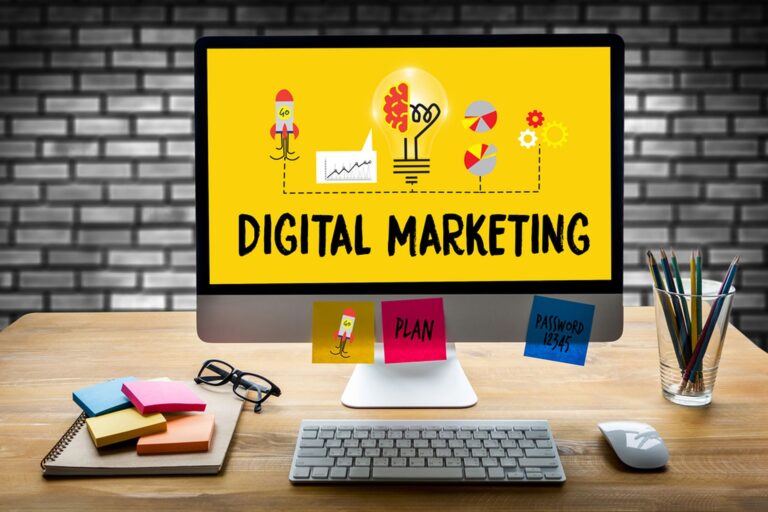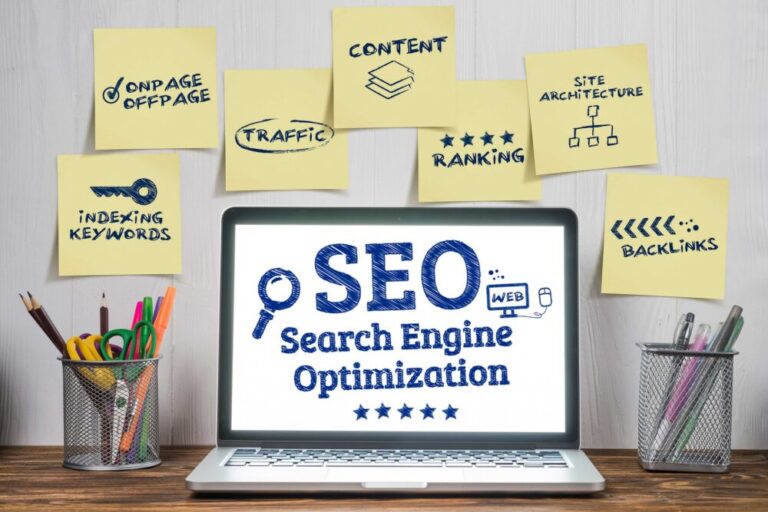Digital marketing is a rapidly growing field that encompasses a wide range of online advertising and promotional techniques. From social media marketing to search engine optimization, digital marketing is essential for businesses looking to reach their target audience in today's digital age. In this guide, we'll cover the basics of digital marketing and explore some of the most effective strategies for promoting your brand online.

What is digital marketing?
Digital marketing refers to the use of digital channels, such as search engines, social media, email, and websites, to promote a product or service. It involves a range of techniques and strategies, including search engine optimization (SEO), pay-per-click (PPC) advertising, content marketing, social media marketing, email marketing, and more.
The goal of digital marketing is to reach and engage with a target audience, build brand awareness, and ultimately drive conversions and sales.
The benefits of digital marketing.
Digital marketing offers a range of benefits for businesses of all sizes. One of the biggest advantages is the ability to reach a large and diverse audience at a relatively low cost. With digital channels, businesses can target specific demographics, interests, and behaviors, allowing them to tailor their marketing messages to the right people at the right time.
Additionally, digital marketing provides real-time data and analytics, allowing businesses to track the effectiveness of their campaigns and make adjustments as needed. Finally, digital marketing is highly measurable, allowing businesses to calculate their return on investment (ROI) and make informed decisions about future marketing strategies.
The different types of digital marketing.
Digital marketing encompasses a wide range of tactics and strategies, each with its own unique benefits and challenges. Some of the most common types of digital marketing include search engine optimization (SEO), pay-per-click (PPC) advertising, social media marketing, email marketing, content marketing, influencer marketing and Affiliate Marketing.
Each of these tactics requires a different approach and set of skills, but when used together, they can create a powerful and effective digital marketing strategy.
Search Engine Optimization (SEO)

Search Engine Optimization (SEO) is the process of optimizing a website or content to improve its ranking and visibility in search engine results pages (SERPs) for relevant keywords and phrases.
The ultimate goal of SEO is to attract more organic traffic to a website and increase its online visibility and authority. We reach our goals using three main tactics in SEO such as On-page, Off-page and technical SEO.
On-page SEO refers to the keyword analysis and let crawler understand your website using top searched keywords.
Off-page SEO refers to creating backlinks that enhances your domain authority and ranks your website on the search engine.
Technical SEO refers to Technical SEO refers to the process of optimizing a website’s technical aspects to improve its ranking and visibility in search engine results pages (SERPs). This includes optimizing elements such as site speed, mobile responsiveness, site architecture, URL structure, and ensuring the website is crawlable and indexable by search engines.
Technical SEO helps search engines better understand a website’s content and structure, making it easier for them to crawl and index the site, resulting in better search engine rankings.
Pay Per Click Advertising

PPC (Pay-per-click) advertising is a digital marketing strategy where advertisers pay each time their ad is clicked on by a user. These ads can appear on search engine results pages (SERPs), social media platforms, and other websites that allow advertising.
PPC advertising allows businesses to target specific audiences based on their interests, demographics, location, and other criteria. Advertisers can also control the cost of their campaigns by setting daily and monthly budgets and bidding on keywords and placements.
The benefits of PPC advertising include the ability to drive immediate traffic to a website, track and measure campaign performance, and easily adjust campaigns to optimize for better results. However, it can also be expensive and requires ongoing management and optimization to be effective.
Social media Marketing (SMM)

Social Media Marketing is the process of using social media platforms such as Facebook, Instagram, Twitter, LinkedIn, and others to promote a product or service. This can include creating and sharing content, running paid advertising campaigns, engaging with followers and customers, and monitoring and analyzing performance metrics.
The benefits of social media marketing include the ability to reach a large audience, engage with customers in real-time, build brand awareness and loyalty, and drive traffic to a website or other online properties.
However, social media marketing also requires a strategic approach to content creation and distribution, as well as ongoing management and monitoring of social media channels to maintain a positive brand reputation and respond to customer feedback.
What is the Email Marketing?

Email marketing is a digital marketing strategy where businesses send targeted promotional messages or newsletters to a list of subscribers via email. This can include a variety of content, such as product updates, discounts, event invitations, or educational content.
The benefits of email marketing include the ability to reach a highly engaged audience who has already expressed interest in the business or its products, the ability to personalize messages to specific segments of the email list, and the ability to track and measure performance metrics such as open rates, click-through rates, and conversion rates.
However, to be effective, email marketing requires careful planning and segmentation of the email list to ensure messages are relevant and engaging to the target audience. Additionally, businesses must comply with email marketing regulations such as GDPR and CAN-SPAM, and provide an easy way for subscribers to opt-out of future communications.
What is Content Marketing?

Content marketing is a digital marketing strategy that involves creating and distributing valuable and relevant content to attract and engage a target audience. This can include blog posts, videos, infographics, whitepapers, podcasts, and other types of content that are designed to educate, inform, or entertain a target audience.
The goal of content marketing is to build brand awareness, establish credibility and authority, and drive profitable customer action. This can include lead generation, customer retention, and revenue growth.
The benefits of content marketing include the ability to provide value to the target audience, establish a relationship with customers, and increase brand loyalty. However, content marketing requires a strategic approach to content creation and distribution, as well as ongoing analysis of performance metrics to ensure the content is resonating with the target audience and driving desired outcomes.
Influencer Marketing

The benefits of influencer marketing include the ability to reach a highly engaged and targeted audience, increase brand credibility, and generate authentic user-generated content. However, it can be expensive and requires careful selection of influencers that align with the brand’s values and target audience. Additionally, businesses must ensure that influencer partnerships comply with regulations and guidelines set by the Federal Trade Commission (FTC).
What is an affiliate marketing?

Affiliate marketing is a digital marketing strategy where businesses pay a commission to affiliates for promoting their products or services. Affiliates can include bloggers, influencers, or other websites that have a relevant audience.
The goal of affiliate marketing is to leverage the affiliate’s audience and influence to drive traffic and sales to the business. Affiliates can promote products through product reviews, banner ads, or links on their website or social media channels.
The benefits of affiliate marketing include the ability to reach a highly targeted audience, increase brand credibility, and generate additional revenue streams for the business. However, it requires careful selection of affiliates that align with the brand’s values and target audience, as well as ongoing management and monitoring of affiliate partnerships to ensure compliance with regulations and guidelines.
By implementing a well-planned affiliate marketing strategy, businesses can expand their reach and increase their sales while building mutually beneficial partnerships with affiliates.
Creating a digital marketing strategy.
Creating a digital marketing strategy involves a systematic approach to achieving business goals through online channels. Here are the steps to creating an effective digital marketing strategy:
Define goals and objectives: Determine what you want to achieve through digital marketing, such as increasing website traffic, generating leads, or building brand awareness.
Identify target audience: Define your ideal customer profile and create detailed buyer personas to understand their needs, interests, and behavior.
Choose channels and tactics: Determine which digital channels and tactics are most appropriate for reaching your target audience, such as search engine optimization (SEO), pay-per-click (PPC) advertising, social media marketing, email marketing, or content marketing.
Create a budget and timeline: Determine how much you are willing to spend on each channel and create a timeline for executing your digital marketing plan.
Implement and optimize: Execute your plan and monitor the performance of each channel, adjusting your strategy as needed to optimize for better results.
Measure results: Use key performance indicators (KPIs) to track the success of your digital marketing strategy, such as website traffic, lead generation, conversion rates, and return on investment (ROI).
By following these steps, businesses can create a well-rounded digital marketing strategy that effectively reaches and engages their target audience, drives profitable customer action, and achieves their business objectives.
Measuring the success of your digital marketing efforts.

Measuring the success of your digital marketing efforts is crucial to understanding what’s working and what’s not. There are a variety of metrics you can track, such as website traffic, conversion rates, social media engagement, and email open rates.
It’s important to set specific goals and benchmarks for each metric, and regularly analyze your data to see how you’re progressing. This will help you identify areas for improvement and make data-driven decisions about your digital marketing strategy.
Remember, success is not just about the numbers – it’s also about building relationships with your audience and creating a strong brand identity.


Pingback: Strategy for Digital Marketing to grow your business - Digital Market